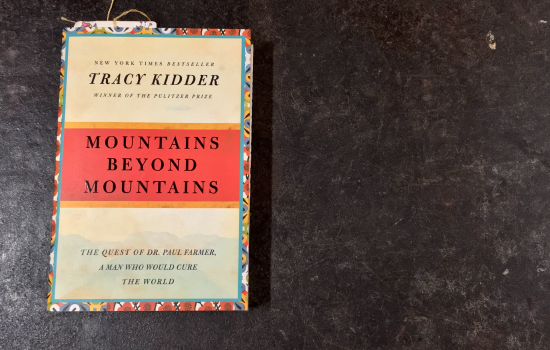In the last section of “Mountains Beyond Mountains,” we cover Part IV, “A Light Month for Travel,” and Part V, “O for the P.” We hope you’ll join us tonight at 6:00 p.m. CST for a live online discussion! (RSVP here)
Summary
In Part IV, “A Light Month for Travel,” we see Dr. Paul Farmer traveling all over the globe – from Haiti to Peru to Cuba, Boston, Russia, France, and back again. Along the way, we gain insight into the models Farmer sees that work best for addressing disease in poor countries as he makes plans for new Partners In Health initiatives; speaks to global groups concerning a variety of infectious diseases, including tuberculosis and AIDS; answers hundreds of daily emails, often consults; and visits patients at every stop. The problem, as Ophelia puts it, is that “Wherever he is, he’s missing from somewhere.” (184)
One of the primary approaches for which Farmer advocates is a preferential option for the poor, or what he calls “O for the P.” What we find in this final section is that neither he nor Jim Yong Kim nor Tracy Kidder expects anyone to follow the model Farmer sets, because almost no one could, but only to learn from it what must be done. And Farmer, feeling the full weight of all there is to do, leaves no room for no doubt that the work must done. When Kidder observes that in this work, the choice to do one necessary thing must always mean the choice not to do another, Farmer agrees, “Every day all day long, that’s all I do. Is not do things.” (287)
However, Farmer continues to dedicate his life to waging the long defeat. He is always glad to find a new patient or discover a new grim situation, because only then can it be addressed. And just because we can’t do everything and we may not ever “win,” we cannot choose not to do the things we can do.
Themes
Waging the long defeat; Persistence; Vocation; Fulfillment
Powerful Lines
- “The problem is, if I don’t work this hard, someone will die who doesn’t have to. That sounds megalomaniacal. I wouldn’t have said that to you before I’d taken you to Haiti and you had seen that it was manifestly true.” (Farmer, 191)
- Of all the world’s errors, he seemed to feel, the most fundamental was the “erasing” of people, the “hiding away” of suffering. (219)
- “One can never work overtime for the poor. We’re only scrambling to make up for our deficiencies.” (Farmer, 245)
- “I have fought the long defeat and brought other people on to fight the long defeat, and I’m not going to stop because we keep losing.” (Farmer, 288)
- …if you say that seven hours is too long to walk for two families of patients, you’re saying that their lives matter less than some others, and the idea that some lives matter less is the root of all that’s wrong with the world. (294)
Questions to Ponder
- The title of the book comes from the Haitian proverb, “Beyond mountains there are mountains.” What does the saying mean in the context of the culture from which it comes ? What does it mean in relation to Farmer’s work?
- What does it mean to wage the long defeat? Why is it so important to Farmer to do this? How can you wage the long defeat where you are?

